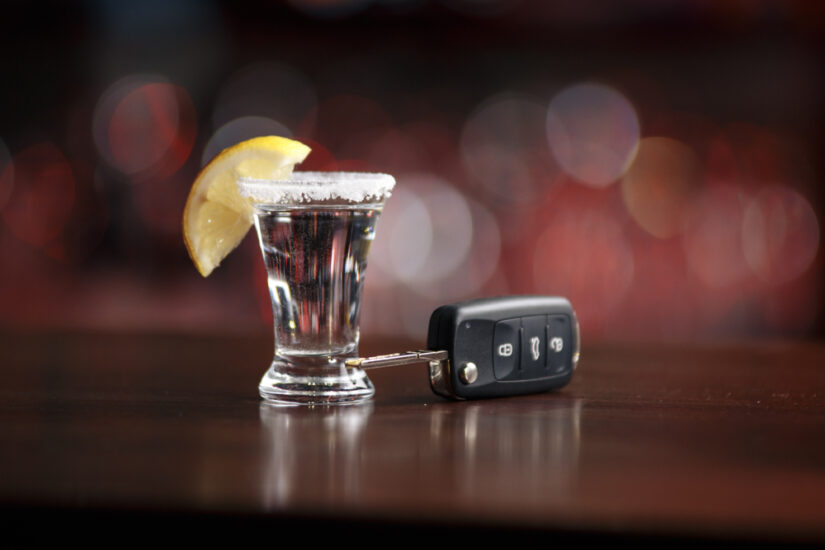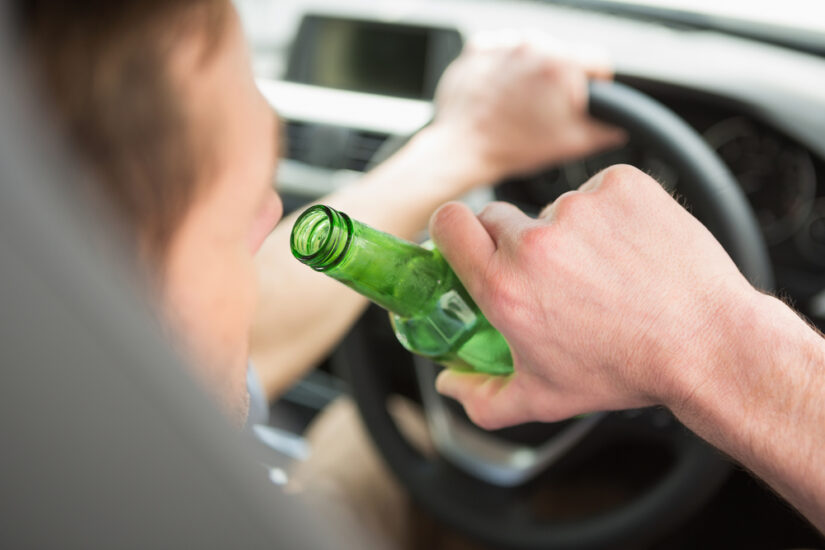July 30, 2024
Texas law takes drunk driving in a motor vehicle seriously, and if you have a DWI or DUI charge, you face potentially harsh consequences. The prosecutor will devote extensive resources to convicting and putting DWI in Texas suspects in jail. For the best outcome, you need a skilled lawyer for a DWI arrest in Texas and the Napier Law Firm can assist you immediately. Our Houston law firm has years of proven experience successfully defending DWI charges, and we are ready to help you.

The Difference Between DWI And DUI In Texas
There are two drunk driver charges possible under Texas laws: DUI and DWI. DWI means driving while intoxicated, and DUI means driving under the influence. The law defines DUI and DWI differently and there are different punishments for each. Both involve your mental or physical faculties being compromised while you are driving.
Texas laws state that drunk driving or DWI is driving while under the influence when the vehicle is being operated in public. Texas considers someone drunk if their faculties have been affected by alcohol or a controlled substance. You are legally intoxicated in Texas if you have a blood alcohol content (BAC) of .08% or higher. DWI cases are frowned upon in Texas and the prosecutor will aggressively attempt to convict you.
A DUI also means driving a motor vehicle while under the influence, but the charge is different. A DUI charge can be brought even if your blood alcohol concentration is below .08%. The difference is that you can be charged with a DUI if you have any trace of drugs or alcohol in your system and are under 21.
A minor under 21 is considered to be engaged in impaired driving if they have any amount of alcohol in their system even if it is below the .08% legal limit. DUI charges are for minors only.
DUI And DWI In Texas Penalties In Criminal Cases
Understanding the differences between a DUI and a DWI is essential because the penalties aren’t the same. In Texas, a DUI is a Class C misdemeanor that only applies to minors. The consequences may be a 60-day driver’s license suspension, a $500 fine, alcohol awareness courses, and up to 40 hours of community service.
A DWI is a Class B misdemeanor. You may receive three to six months in jail for a first offense for a .08% or higher alcohol concentration. You can also get a $2,000 fine and a driver’s license suspension for a year. The charge and arrest will also affect your criminal record.
If your blood alcohol concentration is .15% or higher, it is a Class A misdemeanor. If you injured or killed someone, the charge may be a second or third-degree felony. Felony charges in Texas may result in 2 to 10 years in prison and a maximum $10,000 fine. You also may be sentenced to community service. A Texas DUI or DWI is serious so retain an attorney today.
Common DWI And DUI Defense Strategies in Texas
A first-offense DWI or DUI in Texas is scary because DWI laws in Texas are strict. However, the prosecutor must prove beyond a reasonable doubt that you were intoxicated and not allowed to drive at the time of the incident. A skilled DUI attorney may rely on one or more of the following defenses:
- Violation of your constitutional rights: If the police violated your rights during the stop or arrest, your attorney can challenge the charges. Law enforcement cannot ignore your constitutional rights by performing an illegal search nor can they arrest you without reading your Miranda rights.
- Breath test problem: A breathalyzer test could be inaccurate if you use mouthwash, take certain prescription medications, or have diabetes. Breath test devices must also be correctly calibrated and regularly checked for accuracy.
- Blood draw problem: After an arrest for DWI, law enforcement will take a blood sample to determine your BAC. For a blood test to be accurate, the worker must follow strict protocols. A blood test can be successfully challenged because of test sample issues or how the blood was drawn.
- Illegal traffic stop: Law enforcement must have a good reason to pull you over. If they do not have probable cause but still stop you, your lawyer may issue a challenge to suppress evidence. Legal reasons to stop you include swerving, weaving, irregular speed, almost hitting another vehicle, or drifting from your lane.
- Alcohol field sobriety test issues for a DUI in Texas: Field sobriety tests are often performed during DWI stops but are sometimes inaccurate. Your attorney may challenge the test results because you falsely tested positive. For example, you could have had difficulty taking the test for driving while intoxicated if you had foot or leg problems or trouble with balance. Certain prescription drugs can also affect test results.
- Affirmative defenses: This means a defense that tries to negate your criminal liability with evidence. For example, you may claim duress as an affirmative defense. This means asserting that you were only driving because of threats to you.
A DWI defense attorney can review your case and determine the best potential defense for driving while intoxicated. If there are aggravating factors, such as having a minor in the car, you face sterner penalties.
FAQs For DWI And DUI
Are DUI and DWI In Texas The Same Thing?
DUI and DWI charges are different. DUI means driving under the influence for someone under 21. If you are under 21 and the police find any trace of alcohol in your system, you can be charged with DUI. DWI means having a .08% or higher BAC and is for those 21 and older. For either charge, you may get a driver’s license suspension. Injuring another person while drinking and driving will result in more severe penalties.
How Long Will a DWI Stay On My Record?
If you are convicted of a DWI in Texas, it usually stays on your record for life. If you want to expunge a criminal record in Texas, speak to a DWI defense attorney. They will tell you if there is any chance of deleting the driving under the influence charge from your record.
Will I Go To Jail For the First Texas DWI?
You can be jailed for a first DWI offense, but it is not a guarantee. The maximum jail time for a first DWI is six months, and many first-time offenders are sentenced to much less or avoid jail time completely with a plea deal. You cannot be jailed for a first DUI; the maximum punishment is a $500 fine.
Will a DUI Or DWI Show On a Background Check?
Yes. DUI and DWI charges and convictions will appear on background checks. A conviction or charge on your record can hamper your employment prospects and cause other life difficulties. Talk to a DWI defense attorney about your legal options for expunging the record.
Can You Still Drive After A DWI Arrest?
Yes, you can still drive after being arrested for DWI but you may need to attend an administrative hearing. At the hearing, you can state your desire to have your driver’s license reinstated, pending the results of your DWI case. You may be eligible for an occupational driver’s license if your license is suspended after a DWI conviction. You should have a DWI defense attorney representing you at the administrative hearing about your license. Your professional licensure is at risk so talk to your attorney today.

Will my Texas University See my DWI Or DUI Arrest?
Colleges and universities in Texas usually perform background checks on students for a DWI charge or conviction. You should check with your attorney if you must disclose your DWI charge or conviction.
Don’t Plead Guilty To A Texas DWI Or DUI Before Talking To An Attorney
Shortly after the driving under the influence arrest, you will appear at an arraignment. You can plead guilty or not guilty and the judge will set a court date.
Some DWI or DUI defendants may be tempted initially to plead guilty at the arraignment to get the case over with. This is a mistake. You should speak to a tough criminal defense attorney first to find out if there are potential defenses.
Having a DWI arrest or charge on your record can have a terrible impact on your life. Not only do you have to worry about jail and fines. Your license could be suspended, and you’ll have higher insurance rates. It also means you probably cannot rent a car and could even lose your job. With so much on the line, always talk to a criminal defense lawyer about your DWI case.
Your attorney can go through every detail of your DUI Texas case. They might file a motion to suppress specific evidence if there were any mistakes during the arrest. Your attorney also will decide if expert witnesses or testimony will benefit your case. They can also evaluate plea bargains and recommend if you should accept. If there is no plea bargain, the next step is to go to trial. Your attorney will present the best evidence and arguments for the most favorable case result for a DWI in Texas.
Speak To A Texas DWI Attorney About DUI Convictions
Now that you know the difference between DWI and DUI in Texas, you should speak to an attorney if you have been arrested. Napier Law Firm is ready to defend your rights if you have been charged with a misdemeanor or felony and face jail time. Call our Texas DWI defense attorneys today at (713) 352-1496 for a free consultation. Our DWI lawyer serves clients in Harris County and its neighboring counties, including Montgomery, Fort Bend, Brazoria, Galveston, Liberty, Chambers, Walker, and Grimes.